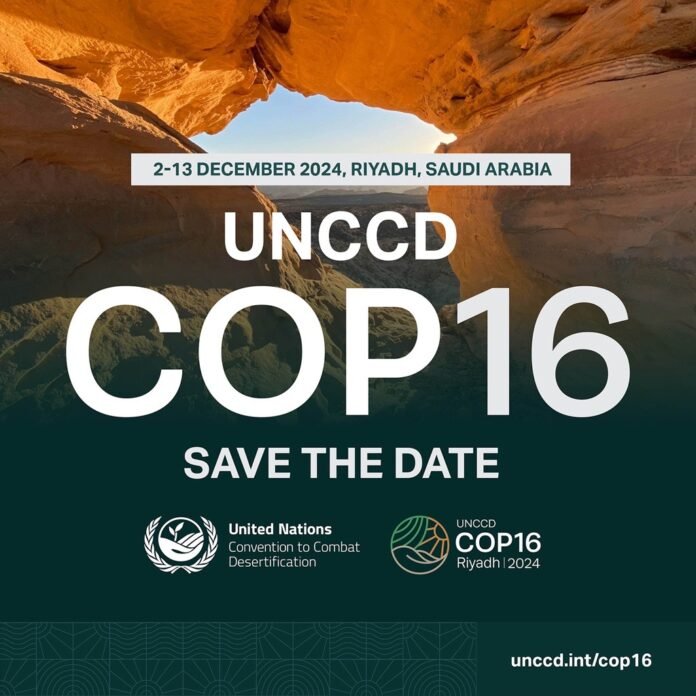The 16th Conference of the Parties (COP16) to the United Nations Convention to Combat Desertification (UNCCD) is underway in Riyadh, Saudi Arabia. The conference brings together global leaders, policymakers, scientists, and activists to address the escalating challenges of land degradation, desertification, and drought, which threaten millions of lives and livelihoods worldwide.
With the theme “Land Restoration for Sustainable Development,” COP16 aims to forge a comprehensive action plan to combat these environmental crises, focusing on sustainable land management, innovative technology, and equitable global cooperation.
The Scope of the Problem
Desertification and drought are among the most pressing environmental issues of the 21st century. According to the UNCCD, over 70% of the Earth’s land has been transformed by human activity, leading to significant biodiversity loss and a sharp decline in land productivity.
Desertification, particularly in arid and semi-arid regions, exacerbates poverty, food insecurity, and migration. Sub-Saharan Africa, parts of the Middle East, and South Asia are among the hardest-hit areas, with communities increasingly forced to abandon uninhabitable lands.
In the face of climate change, the frequency and severity of droughts have intensified, further stressing agricultural systems, water supplies, and ecosystems. The UN estimates that by 2050, droughts could affect over three-quarters of the global population.
Key Agendas at COP16
The conference focuses on several key issues, aiming to align policies with the broader goals of the UN’s 2030 Agenda for Sustainable Development:
- Land Restoration: Delegates are exploring large-scale initiatives to restore degraded land. Restored ecosystems can act as carbon sinks, mitigating climate change and improving biodiversity.
- Financing Mechanisms: Adequate funding for sustainable land management remains a significant barrier for developing nations. COP16 seeks to establish partnerships between governments, financial institutions, and the private sector to close the funding gap.
- Early Warning Systems for Drought: Developing robust drought-monitoring systems and predictive technologies is critical to preparing communities for extreme weather events.
- Equity and Inclusion: The conference emphasizes the role of women, indigenous peoples, and youth in combating land degradation, as they are often the first to face the consequences of environmental crises.
A Landmark Agreement in the Making
One of the most anticipated outcomes of COP16 is a potential global pact to tackle drought and desertification, akin to the Paris Climate Agreement for emissions reduction. The pact would provide a framework for international cooperation, committing countries to measurable targets for land restoration and drought resilience.
The Saudi government, hosting the conference, has showcased its ambitious Middle East Green Initiative, which includes planting 50 billion trees across the region and restoring vast stretches of degraded land. This initiative has received widespread praise and serves as a blueprint for large-scale environmental projects globally.
Challenges Ahead
Despite the optimism surrounding COP16, significant hurdles remain. Many nations are still grappling with the economic consequences of the COVID-19 pandemic, which have slowed environmental investments. Additionally, balancing economic development with environmental preservation continues to be a contentious issue in rapidly industrializing regions.
Moreover, developed nations are under scrutiny for failing to meet their financial commitments to assist poorer countries. Bridging this gap is essential for the success of any global framework adopted at COP16.
The Path Forward
As COP16 progresses, its outcomes could have far-reaching implications for the global fight against land degradation. Implementing sustainable agricultural practices, protecting natural habitats, and restoring degraded ecosystems will not only safeguard livelihoods but also contribute significantly to global climate goals.
In his opening address, UNCCD Executive Secretary Ibrahim Thiaw highlighted that tackling desertification and drought is not just an environmental imperative but a humanitarian one. “We must act decisively now to secure the future of our planet and the well-being of all who inhabit it,” he stated.
In conclusion, COP16 represents a critical opportunity for the international community to unite against one of the most overlooked yet devastating environmental challenges of our time. If successful, the policies and commitments forged in Riyadh could mark a turning point in the quest for a more sustainable and equitable world.
